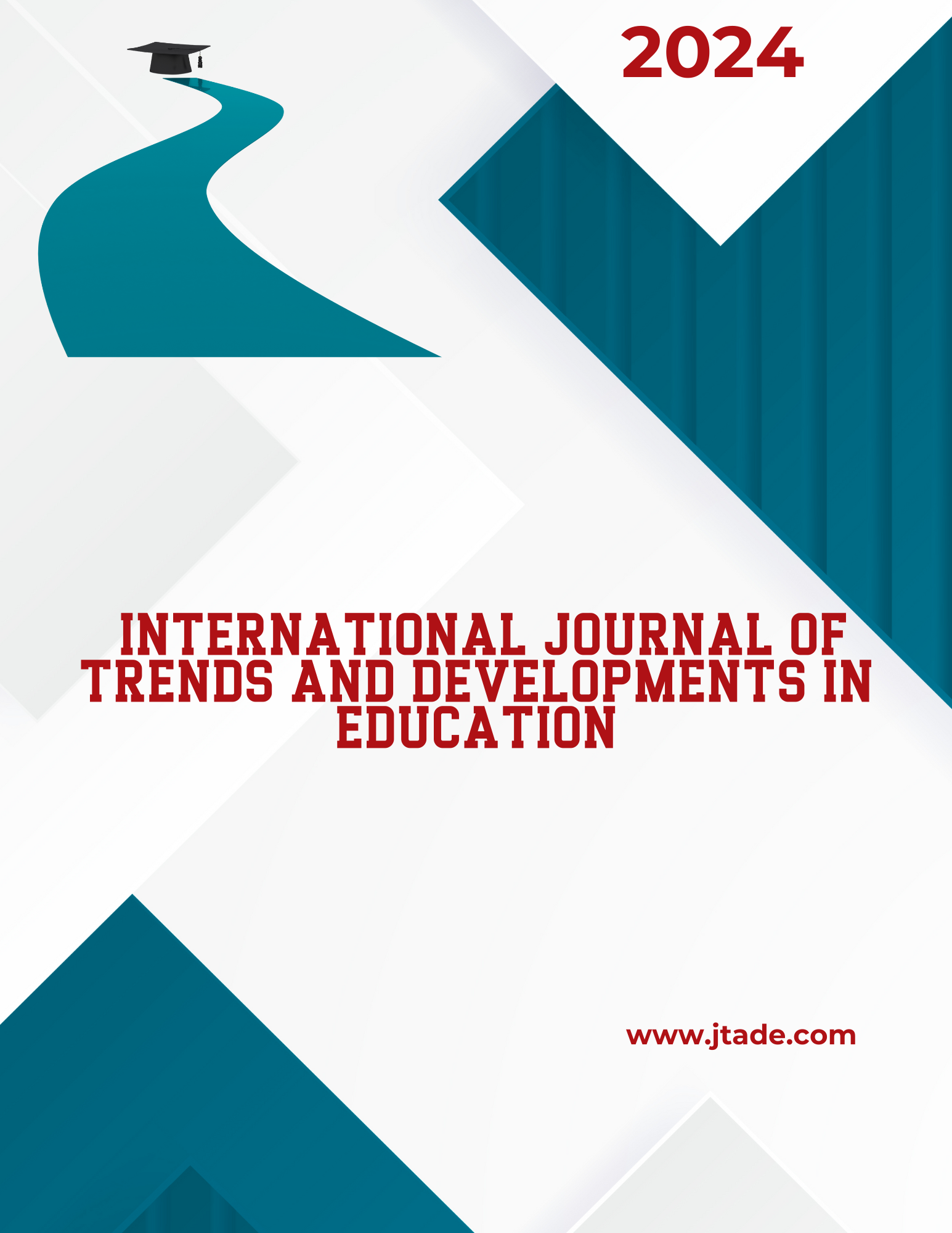Research article | Open Access
International Journal of Trends and Developments in Education 2022, Vol. 2(2) 1-15
Evaluation of TUBITAK 2204-B Research Projects Invited to the Regional Exhibition from the Perspectives of Consultant Teachers
pp. 1 - 15
Publish Date: December 24, 2022 | Single/Total View: 78/111 | Single/Total Download: 82/117
Abstract
This study aims to evaluate the TUBITAK 2204-B Research Projects process from the perspective of the teachers who advise the projects invited to the regional exhibition. In this study, the phenomenology design, one of the qualitative research methods, was used. While determining the study group of the research, criterion sampling, one of the purposive sampling methods, was used. Five advisor teachers were included in the study group. While determining the participants of the study, it was noted that the consultants of the projects invited to the regional exhibition were among the teachers who provided consultancy in TUBITAK 2204-B Research Projects. Obtained data were analyzed by forming codes and themes by taking the opinions of the advisor teachers about the process. As a result of the findings obtained in this research, the prominent features of TUBITAK 2204-B Research Projects; it has a scientific and academic point of view, the idea of the project has an important place in the process, it increases the creativity of students and offers solutions to the problems encountered in daily life. It was concluded that the TUBITAK 2204-B Research Projects regional exhibition positively affected the participants by learning scientific research stages, increasing self-confidence, improving communication skills, gaining a new perspective, and generating new ideas.
Keywords: Project, Regional exhibition, Research project, TUBITAK 2024
APA 7th edition
Kurt, F., & Kurt, L. (2022). Evaluation of TUBITAK 2204-B Research Projects Invited to the Regional Exhibition from the Perspectives of Consultant Teachers. International Journal of Trends and Developments in Education, 2(2), 1-15.
Harvard
Kurt, F. and Kurt, L. (2022). Evaluation of TUBITAK 2204-B Research Projects Invited to the Regional Exhibition from the Perspectives of Consultant Teachers. International Journal of Trends and Developments in Education, 2(2), pp. 1-15.
Chicago 16th edition
Kurt, Fatih and Lale Kurt (2022). "Evaluation of TUBITAK 2204-B Research Projects Invited to the Regional Exhibition from the Perspectives of Consultant Teachers". International Journal of Trends and Developments in Education 2 (2):1-15.
Avcı, E., Özenir, Ö. S., & Yücel, E. (2016). TÜBİTAK ortaöğretim öğrencileri araştırma projeleri yarışmasına katılan öğrencilerin yarışma sonrası kazanımlarının incelenmesi. Uşak Üniversitesi Sosyal Bilimler Dergisi, 9(27/3), 1-21.
Ayaydın, Y., & Duygu, Ü. N. Bilim ve Sanat Merkezi Öğretmenlerine Göre Üstün Yetenekli Öğrencilerin Eğitimi ve Bilsem’ler. Amasya Üniversitesi Eğitim Fakültesi Dergisi, 7(1), 121-155.
Başbay, A. (2005). Basamaklı Öğretim Programıyla Desteklenmiş Proje Tabanlı Öğrenme Yaklaşımının Öğrenme Sürecine Etkileri. Ege Eğitim Dergisi, 6(1), 95-116.
Başkale, H. (2016). Nitel araştırmalarda geçerlik, güvenirlik ve örneklem büyüklüğünün belirlenmesi. Dokuz Eylül Üniversitesi Hemşirelik Fakültesi Elektronik Dergisi, 9(1), 23-28.
Büyüköztürk, Ş., Kılıç Çakmak, E., Akgün, Ö. E., Karadeniz, Ş., & Demirel, F. (2012). Örnekleme yöntemleri. Pegem Yayıncılık, Ankara
Canigüroğlu, H. (2019). Tübitak ortaokul öğrencileri araştırma projelerinin bilimsel danışmanlık süreci yönetimi: Fen bilimleri örneği (Master's thesis, Eğitim Bilimleri Enstitüsü).
Creswell, J. W. (2016). Nitel araştırma yöntemleri: Beş yaklaşıma göre nitel araştırma ve araştırma deseni(Çev. Ed. M. Bütün ve S. B. Demir.). Siyasal Kitabevi: Ankara
Çeken, Ç. (2017). TÜBİTAK ve MEB proje yarışmaları süreçlerinin karşılaştırılması. Aksaray Üniversitesi Sosyal Bilimler Enstitüsü Dergisi, 1(2), 46-52.
Çetin, O., Şengezer, B. (2013). Ortaokul öğrencilerinin proje çalışmalarına ilişkin görüşleri. Ege Eğitim Dergisi, 14(1), 24–49.
Deveci, İ., & Daşçı, H. (2020). Ortaokul Seviyesi TÜBİTAK Araştırma Projeleri Yarışmasına Katılan Danışman Öğretmenlerin Proje Deneyimleri. Journal of Individual Differences in Education, 2(2), 75-97.
Durmuş, M. E. (2020). Matematik öğretimi bağlamında ilkokul öğretmenlerinin kaynaştırma öğrencilerine yönelik deneyimleri: Bir olgu bilim araştırması (Master's thesis, Sosyal Bilimler Enstitüsü).
https://tubitak.gov.tr/sites/default/files/2750/ortaokul_proje_rehberi_2022_v3.pdf (son erişim tarihi: 01.06.2022)
Karademir, E., Sarikahya, E., & Altunsoy, K. (2017). Fen bilimleri öğretmenlerinin beceri kavramına yönelik algıları: bir olgubilim çalışması. Eskişehir Osmangazi Üniversitesi Sosyal Bilimler Dergisi, 18(1), 53-71.
Korkmaz, H. & Kaptan, F. (2001). Fen eğitiminde proje tabanlı öğrenme yaklaşımı. Hacettepe Üniversitesi Eğitim Fakültesi Dergisi, 20, 193-200.
Küfrevioğlu, R. M., Baydaş, Ö., & Göktaş, Y. (2011). Proje ve beceri yarışmalarında elde edilen kazanımlar, karşılaşılan zorluklar ve öneriler. 5th International Computer&Instructional Technologies Symposium, Elazığ
Miles, M. B. & Huberman, A. M. (1994). Qualitative data analysis: An expanded sourcebook. USA-California: Sage.
Özet, İ. (2014). Kent araştırmaları ve nitel yöntem. Yayınlanmamış Yüksek Lisans Tezi, Süleyman Demirel Üniversitesi Sosyal Bilimler Enstitüsü, Isparta.
Öztuna Kaplan, A. ve Diker Coşkun, Y. (2012). Proje tabanlı öğrenme uygulamalarında karşılaşılan güçlükler ve çözüm önerilerine yönelik bir eylem araştırması. Mersin Üniversitesi Eğitim Fakültesi Dergisi, 8(1), 137-159.
Yıldırım, A. ve Şimşek, H. (2021). Sosyal bilimlerde nitel araştırma yöntemleri. (12. Baskı). Seçkin Yayıncılık, Ankara
